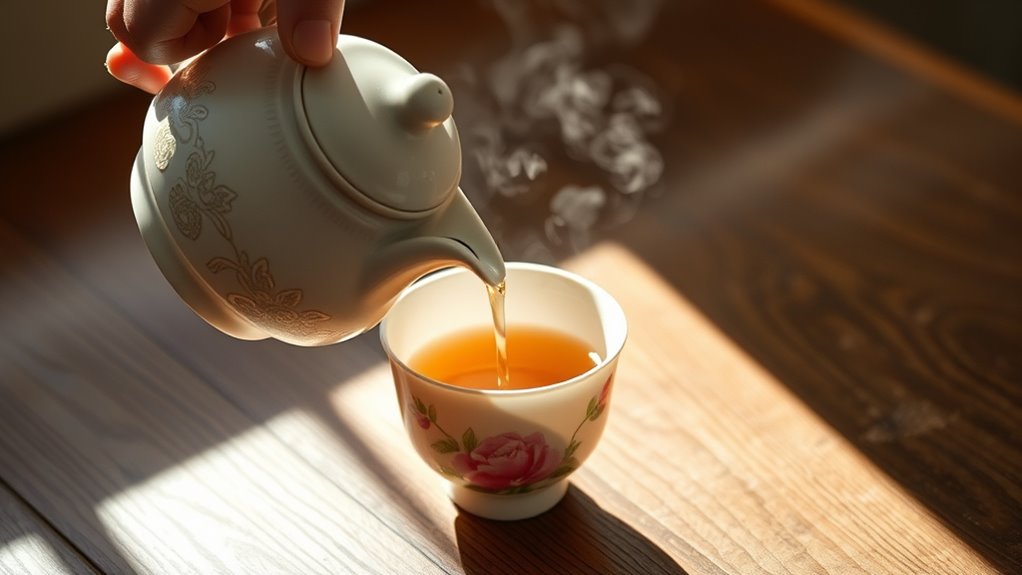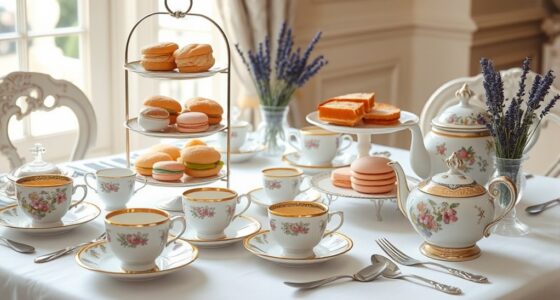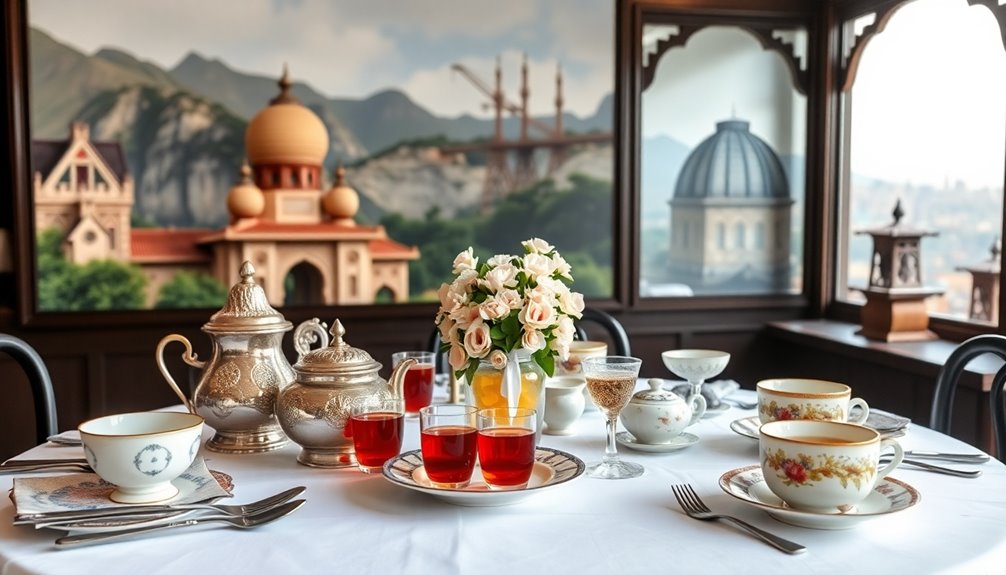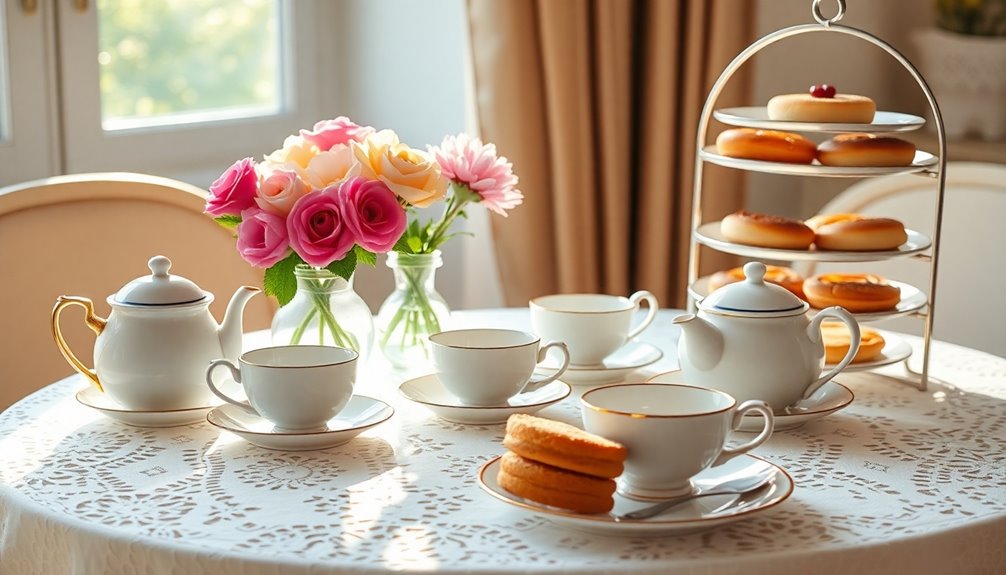When you pour tea mindfully, you engage in a ritual that fosters patience, respect, and calmness. This act isn’t just about manners; it’s a way to connect emotionally with others, showing care and attentiveness. The slow, deliberate pouring signals self-control and creates a shared sense of harmony. By understanding the cultural and psychological significance, you deepen your appreciation for tea etiquette. If you keep exploring, you’ll discover how these subtle gestures shape meaningful human interactions.
Key Takeaways
- Mindful pouring signals patience and attentiveness, fostering trust and emotional connection during tea rituals.
- Slow, deliberate pouring promotes calmness and encourages mindfulness in both the server and guest.
- Precise pouring reflects respect, self-control, and consideration for the guest’s experience.
- Ritualistic pouring creates shared cultural meaning, strengthening social bonds and collective identity.
- The physical act and material of pouring influence emotional tone, enhancing feelings of respect, care, and harmony.
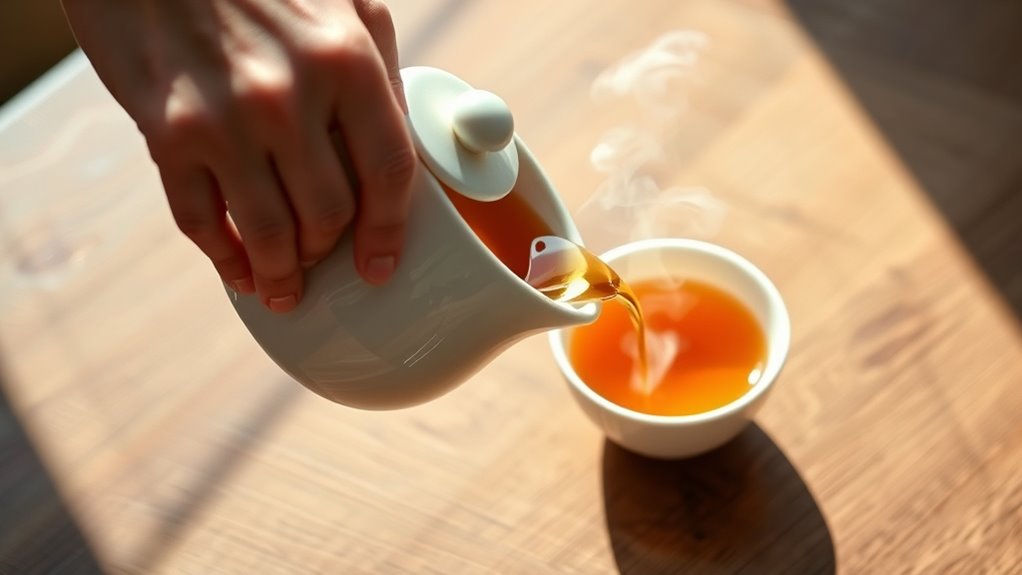
Tea etiquette is more than just about manners; it reflects underlying psychological principles that influence how we connect and communicate. When you pay attention to proper pouring techniques, you’re not simply following rules—you’re engaging in a ritual that carries deep cultural significance. This act of mindful pouring can evoke feelings of respect, tradition, and shared identity, strengthening emotional connections between people. Whether you’re serving tea in Japan, China, or Britain, the way you pour embodies a respect for cultural heritage that resonates on a subconscious level. You sense that this act isn’t just about the beverage; it’s about honoring a history and creating a space where meaningful interactions can unfold.
Mindful pouring honors cultural heritage and deepens emotional connections through respectful, meaningful rituals.
The way you handle the teapot and pour the tea plays an essential role in establishing a sense of calm and mindfulness. When you pour slowly and with intention, it signals patience and attentiveness—traits that foster trust and openness. This deliberate act can evoke a collective feeling of harmony, reminding everyone present that the moment is valued. In many cultures, the precision of pouring is seen as a reflection of self-control and respect for the guest. As you pour, you’re subtly communicating a desire to create a comfortable, respectful environment, which encourages others to relax and engage more openly. This emotional connection is rooted in the shared experience of the ritual, making the act of pouring more than just functional—it becomes a meaningful gesture. Additionally, the material of the kettle and the way it retains heat can influence the overall experience, emphasizing the importance of choosing the right tea kettle material.
Your mindful pouring also taps into the psychological concept of social bonding. When you pour tea for someone else, you’re demonstrating generosity and thoughtfulness, reinforcing social bonds and mutual regard. This act of service fosters warmth and trust, making interactions more genuine. It’s a way to express care without words, allowing emotional connections to deepen naturally. Furthermore, the consistency and rhythm of pouring can influence the mood of the gathering, helping everyone feel centered and present. The subtle movements involved in pouring tea are more than physical actions—they’re a form of non-verbal communication that can convey respect, gratitude, and shared values.
In essence, mastering the art of mindful pouring isn’t just about proper technique; it’s about understanding its psychological impact. It’s a ritual that nurtures emotional connection, encapsulates cultural significance, and creates a space where authentic human interactions flourish. When you pour tea with mindfulness, you’re not only serving a beverage—you’re fostering a deeper sense of connection that transcends words.
Frequently Asked Questions
How Does Mindfulness Influence Tea Pouring Techniques?
Mindfulness influences your tea pouring techniques by encouraging mindful awareness, which helps you focus on each step with intention. As you pour, you naturally develop pouring precision, controlling the flow and angle to avoid spills and ensure a smooth pour. This focused attention not only enhances the experience but also promotes calmness and connection with the moment, making your tea ritual more meaningful and enjoyable.
Can Mindful Pouring Improve Overall Tea-Drinking Experience?
Did you know that practicing mindfulness can boost your tea-drinking satisfaction by up to 30%? When you focus on tea aroma and pouring precision, you elevate the entire experience. Mindful pouring helps you appreciate subtle flavors and aroma nuances, making each sip more enjoyable. By paying attention to your movements and the tea’s qualities, you create a calming ritual that transforms a simple act into a mindful, enriching moment.
What Cultural Differences Exist in Tea Pouring Etiquette?
You’ll notice that cultural variations profoundly shape tea pouring etiquette worldwide. In Japan, traditional customs emphasize precise, respectful pouring, often with both hands. In contrast, Chinese traditions focus on the flow and harmony of pouring, while British customs might prioritize politeness and moderation. Understanding these traditional customs helps you appreciate each culture’s unique approach, fostering respect and enhancing your overall tea experience across different settings.
How Does Tea Pouring Relate to Stress Reduction?
Think of tea pouring as a gentle river flowing through your hands, calming your mind. When you pour mindfully, you engage in emotional regulation, guiding your feelings like a steady current. This act helps you release tension and promotes relaxation, transforming a simple gesture into a moment of tension release. By focusing on each pour, you create a peaceful rhythm that eases stress, nurturing your emotional well-being.
Are There Specific Mental Health Benefits Linked to Mindful Tea Rituals?
You might find that engaging in mindful tea rituals offers mental health benefits like improved emotional regulation and meditative focus. As you slow down to pour and sip, you create a calming routine that helps manage anxiety and stress. This meditative focus encourages present-moment awareness, fostering emotional stability. Regular practice can enhance your overall mood, reduce mental clutter, and support a balanced mindset, making tea rituals a simple yet effective tool for mental well-being.
Conclusion
Think of tea pouring as tending a delicate garden; each careful movement nurtures calm and connection. When you mindfully pour, you’re cultivating patience and mindfulness—watering your own well-being. Just as a garden flourishes with attention, so does your inner peace. Embrace these small acts, for they’re the quiet roots that grow resilience. In this simple ritual, you craft a sanctuary of serenity, turning everyday moments into a flourishing oasis of calm.

